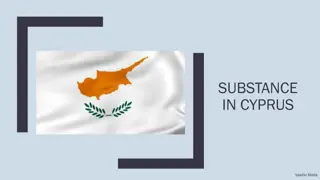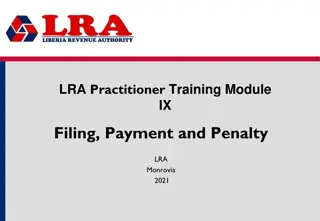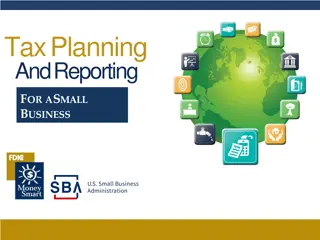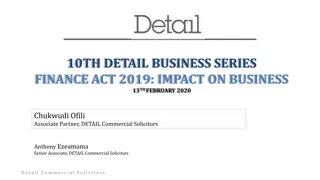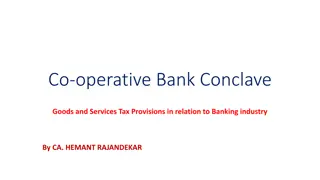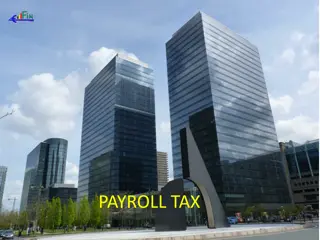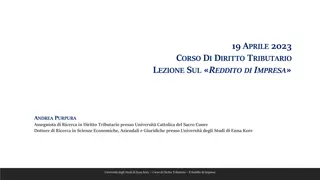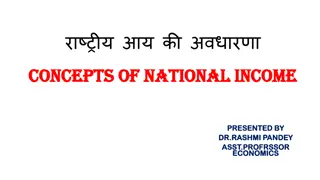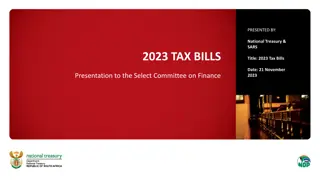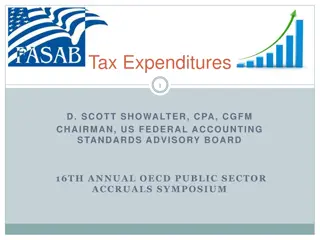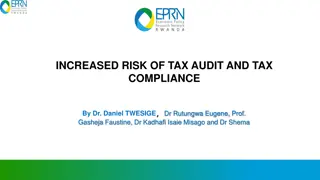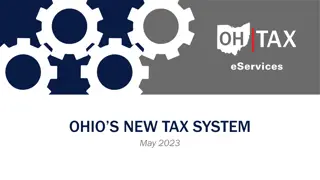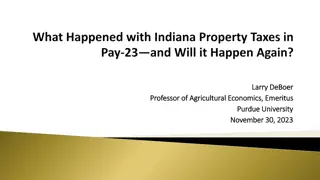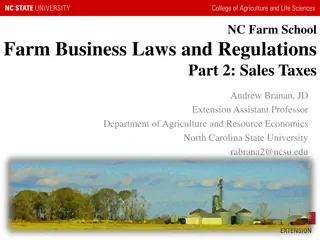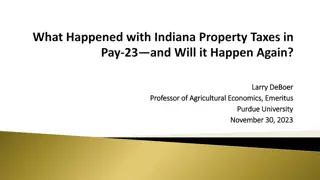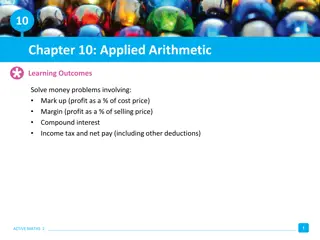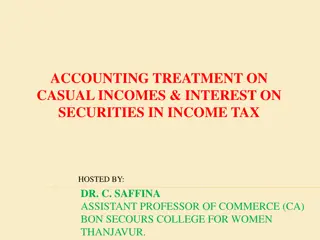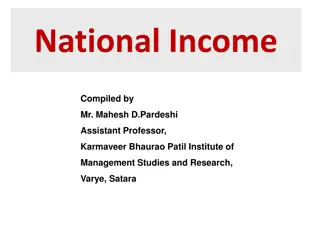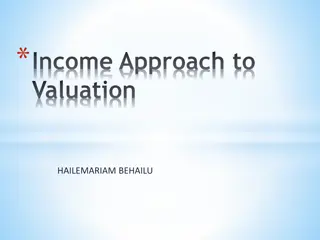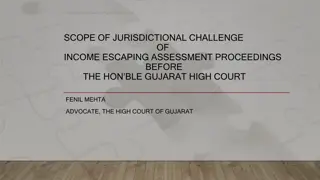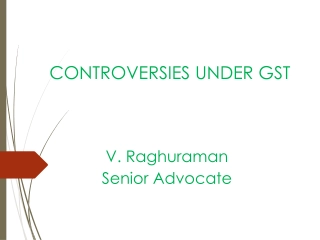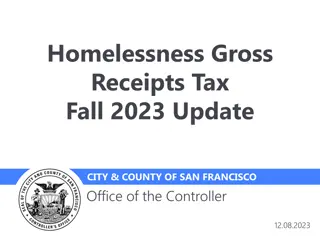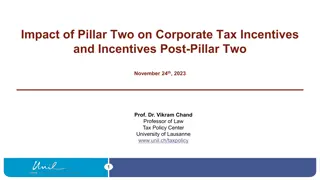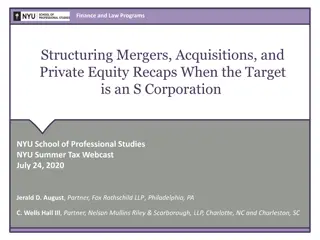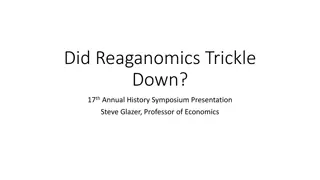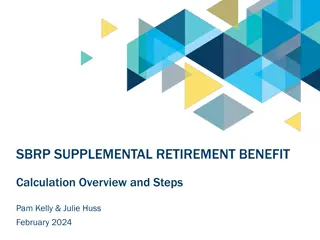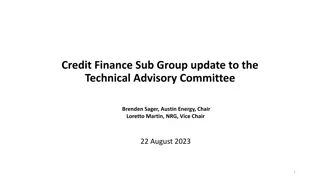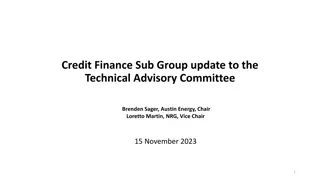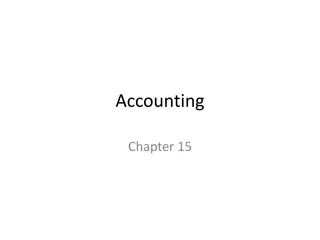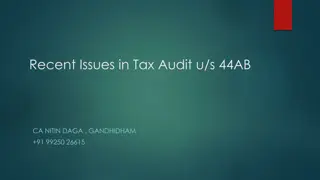Controversial issues under the Income Tax & Fake Invoice
Controversial issues surrounding income tax and fake invoices discussed at the National Conference in Indore. Topics include fake billing, burden of proof, and maintaining quantity details to avoid scrutiny. Learn about cases where genuine transactions were questioned and how to prevent disallowance of purchases.
Download Presentation

Please find below an Image/Link to download the presentation.
The content on the website is provided AS IS for your information and personal use only. It may not be sold, licensed, or shared on other websites without obtaining consent from the author. Download presentation by click this link. If you encounter any issues during the download, it is possible that the publisher has removed the file from their server.
E N D
Presentation Transcript
Controversial issues under the Income Tax & Fake Invoice National Conference Indore Branch of CIRC of ICAI 23rdDecember, 2023 Tushar P. Hemani Tushar P. Hemani Senior Advocate Senior Advocate Tushar Hemani, Senior Advocate 1
Fake Invoice - IT Accommodation Billing Fake Billing Genuine transaction becomes billing transaction due to lack of proof or supplier related issues; Supplier not traceable Supplier never existed Supplier is alleged to be bogus Supplier is proved to be bogus Supplier s GST registration prospectively or retrospectively is cancelled Tushar Hemani, Advocate 2
PO & Invoice [Invoice Reference Number (IRN)]; E-way bill; Transport receipt, affidavit of driver; Weight bridge slip; Toll payment receipts; RFID vehicle tracking details; GSTR1 of Seller, GSTR2B of buyer, GSTR3B filed by both the parties; Correspondence with supplier; CCTV footage; payment details and relevant bank statement; Internal documents e.g. details etc. Inward register, quantity Tushar Hemani, Senior Advocate 3
Quantify Details Even though the assessee was a scrap dealer, the addition u/s. 69C on account of bogus purchases was held not justified as assessee had maintained trading account with purchases, opening stock, sales and closing stock and no discrepancy in such quantitative tally was found - Manoj Sharma taxmann.com 105 (Delhi - Trib.) What if quantity details are not maintained; quantitative tally of v. ITO [2019] 103 Tushar Hemani, Senior Advocate 4
Burden of Proof Where transportation bills, confirmed copy of account and VAT Registration of sellers as also their income-tax Return and payment was impugned purchases could not be disallowed - CIT v. Odeon Builders (P.) Ltd. 418 ITR 315 (SC). Where assessee brought on record name and address of parties, their PAN, TDS deducted, date of bills, details of cheques issued, etc., to establish genuineness of purchase transactions, in such a case, he could not be held responsible for parties not appearing in person and, thus, addition so made under section 69C deserved to be deleted - Pr. CIT v. Chawla Interbild Construction Co. (P.) Ltd. 412 ITR 152 (Bom). assessee had submitted purchase bills, made through cheques, Tushar Hemani, Senior Advocate 5
Natural Justice Merely on suspicion bases on information received from sales Tax authority, assessing officer could not make addition on account of bogus purchases without carrying out independent enquiry and affording opportunity to Assessee to controvert statements made by seller - Pr. CIT v. Shapoorji Pallonji & Co. Ltd. [2022] 288 Taxman 661 (SC). No addition can be made in respect of bogus purchases merely on the basis of material / information received from the Maharashtra Sales Tax Department without providing such material to the assessee or affording an opportunity to cross examine the concerned Keshavlal Shah vs. ITO ITA 1877 to 1879/Ahd/2015. parties - Shailesh Tushar Hemani, Senior Advocate 6
Sales whether accepted? Bombay High Court in the case of Pr. CIT v. Nitin Ramdeoji taxmann.com 546 held that Where AO made addition by disallowing expenses on purchases on ground that an information was received from sales tax department beneficiary of accommodation entries on account of bogus purchases, in absence of AO not disputing corresponding purchases could not be treated as bogus and, thus, impugned addition made on account of bogus purchases to be deleted. Lohia [2022] 145 that assessee was sales transactions, Tushar Hemani, Senior Advocate 7
Percentage disallowance CIT vs La Medica 250 ITR 575 (Del) 100% Sanjay Oil Cake Ind vs CIT 316 ITR 274 (Guj) 25% Pr. CIT v. Suraj Infrastructures taxmann.com 192 (Bombay) 12.5% Pr. CIT v. Rakesh taxmann.com 82 (Gujarat) 6% CIT vs. Gujarat Ambuja Export Ltd. [2014] 43 taxmann.com 244 (Gujarat) 5% (P.) Ltd [2023] 156 Kailashchand Jain [2023] 156 Tushar Hemani, Senior Advocate 8
Other Approaches Dhondiram Naryan Limbhore vs Pr.CIT 153 taxmann.com 539 (Bom) addition was to be limited to extent of bringing GP rate on tainted purchases at same rate as applied in other genuine purchases. Nehal Hsamukhari Gandhi vs. DCIT ITA 2578/Ahd/2017 - NP Tushar Hemani, Senior Advocate 9
Other Issues Distinction between a trader, manufacturer and/or consumer. Rejection of books of accounts 145(3); GP/NP comparison average); Disallowance u/s (expenditure incurred and Assessee offers no explanation) Impact of S. 40A(3) [Hynoup - 290 ITR 702 (Guj)]; GP addition vs addition as percentage of bogus purchases (history & Industry 69C justified? Tushar Hemani, Senior Advocate 10
Curious case of N K Ind Ltd [2016] 72 taxmann.com 289 (Gujarat) Whether confirmed by HC Before Guj High Court, both Revenue and Assessee were in appeal. Assessee was in appeal against confirmation of disallowance @ 25% out of purchases whereas Revenue was deletion of 75% out of purchases by the ITAT. Hon ble High Court while dismissing both the appeals, gave the following finding: 25% or 100% disallowance is in appeal against Tushar Hemani, Senior Advocate 11
6. The Tribunal in the case of Vijay Proteins Ltd. (supra) has observed that it would be just and proper to direct the Assessing Officer to restrict the addition in respect of the undisclosed income relating to the purchases to 25% of the total purchases. The said decision was confirmed by this Court as well. On consideration of the matter, we find that the facts of the present case are identical to those of M/s. Indian Woollen Carpet Factory (supra) or Vijay Proteins Ltd. (supra) In the present case the Tribunal has categorically observed that the assessee had shown bogus purchases amounting to Rs. 2,92,93,288/- and taxing only 25% of these bogus claim goes against the principles of Sections 68 and 69C of the Income Tax Act. The entire purchases shown on the basis of fictitious invoices have been debited in the trading account since the transaction has been found to be bogus. The Tribunal having once come to a categorical finding that the amount of Rs. 2,92,93,288/- represented alleged purchases from bogus suppliers it was not incumbent on it to restrict the disallowance to only Rs. 73,23,322/-. xxx 9. In view of the above, the impugned judgment and order passed by the Tribunal is modified accordingly. Hence, the present Tax Appeals are dismissed. Tushar Hemani, Senior Advocate 12
Assessee preferred SLP against confirmation of 25% which got dismissed. [2017] 84 taxmann.com 195 (SC) Subsequently, Gujarat distinguished judgement in the case of N K Ind. Ltd. In the following cases: [2019] 106 taxmann.com 316 (Gujarat) Pr. CIT v. Synbiotics Ltd. [2023] 148 taxmann.com 154 (Gujarat) Pr. CIT v. Surya Impex High Court itself Tushar Hemani, Senior Advocate 13
Bogus Billing GST Tushar Hemani, Senior Advocate 14
Evidences to prove genuineness of the transaction State Coffee Trading Pvt. Ltd. (2023) 4 Centax 223 (S.C.): In view of the above and for the reasons stated above and in absence of any further cogent material like furnishing the name and address of the selling dealer, details of the vehicle which has delivered the goods, payment of freight charges, acknowledgement delivery of goods, payment particulars etc. and the actual physical movement producing the cogent materials . of Karnataka vs Ecom Gill of taking and tax invoices of the goods by Tushar Hemani, Senior Advocate 15
Evidences GSTR1 of Seller, GSTR2B of buyer, GSTR3B filed by both the parties. PO & Invoice [Invoice Reference Number (IRN)]; E-way bill; Transport receipt, affidavit of driver, Weight bridge slip, Toll payment receipts; RFID/GPS vehicle tracking details, CCTV footage; payment details and relevant bank statement; Internal documents e.g. Inward register, quantity details etc. Correspondence with supplier; Tushar Hemani, Senior Advocate 16
Scheme of the GST Act GST tax on supplies of goods or services. Tax only on value addition to the extent goods or supplies suffered tax earlier, available in the form of ITC. Identity of goods or supplies that has suffered tax. S. 16 - Eligibility and condition for taking ITC - Registered person can claim ITC if he is in possession of tax invoice/debit note etc issued by supplier of goods or services. So ITC can only flow from supplier. No claim of ITC allowed if tax not paid by supplier into Govt treasure S. 16(2)(c) S. 155 - Burden of proof for entitlement of ITC is on the claimant. Tushar Hemani, Senior Advocate 17
Issues GST investigations reveal that Supplier not traceable; Supplier never existed at the billing address; Supplier is alleged to be bogus as it has no place of business/godown or supplies or has not filied required returns; Supplier is proved to be bogus as he has confessed during investigation to that effect by giving statement/affidavit. Supplier s GST registration prospectively or retrospectively; Supplier s supplier has any of the above stated issues. is cancelled Tushar Hemani, Senior Advocate 18
Consequences Proceedings u/s 73; Proceedings u/s 74; Summons u/s 70; Bank attachment u/s 83; Arrest u/s 69 rw S. 132. Tushar Hemani, Senior Advocate 19
S. 73 / S. 74 Insist for formal communication Intimation (DRC-01A), SCN u/s 73-74 (DRC-01), so that appropriate reply can be filed and defenses can be raised. No recovery is permissible w/o SCN and adjudication (Gokak Patel Volkart Ltd. vs. Collector of Central Excise 1987 (28) ELT 53 (S.C.)) Payment under protest via letter is a valid mechanism when no mechanism is notified in the law - India Cements Ltd. vs CCE 1989 (41) E.L.T. 358 (S.C.) Tushar Hemani, Senior Advocate 20
Scheme of availing the benefit of lower penalty u/s 74(5) of the CGST Act, 2017 is to be exercised at the complete discretion of the taxpayer as the same entails communication of the amounts paid as per the said scheme to the officer to seek conclusion of the proceedings. It cannot apply when the taxpayer intends to contest the matter [Shri Nandhi Dhall Mills India Pvt vs. Senior Senior Intelligence Officer W.P. No. 5192 of 2020) (Mad.)] 27. Merely because an assesseehas, under the stress of investigation, signed a statement admitting tax liability and has also made a few payments as per the statement, cannot lead to self-assessment ascertainment contemplated under Section 74(5) is of the nature of self- assessment and amounts to a determination which is unconditional, and not one that is retracted as in the present case. Had such ascertainment/self- assessment had been made, there contemplated, as Section 74(6) states that with ascertainment of demand in Section 74(5), no proceedings for show cause under Section 74(1) shall be issued. In this case, enquiry and investigation are on-going, personal hearings have been afforded and both the issuing/receiving a show cause notice and taking matters forward. Thus, the understanding and application of Section 74(5) in this case, is, in my view, wholly misconceived. or self-ascertainment. The would be no further proceedings parties are fully geared towards Tushar Hemani, Senior Advocate 21
Only the first buyer needs to pay tax in a chain of transactions (Circular 171 dt. 06/07/2022). Instruction No. 25.05.2022 No collection or deposit of tax during the course of search, inspection or investigation. deposited voluntarily. 01/2022-23 dated Unless Tushar Hemani, Senior Advocate 22
Summons, Bank Attachment & Arrest Summons 17.08.2022 Guidelines for issuance of summons no summons for collecting statutory records, or to call MD, CFO unless necessary. Bank attachment - Provisional attachment S. 83 after initiation of proceedings under chapters XII, XIV, XV Commissioner is of the opinion that in order to protect interest of the revenue (Radha Krishan Industries v. State of Himachal Pradesh 2021 (48) G.S.T.L. 113 (S.C.) - Instruction No. 03/2022-23 dated Tushar Hemani, Senior Advocate 23
Arrest and Bail 02/2022-23 Power to be exercised exceptionally. Arrest only when the need to ensure proper investigation and prevent the possibility of tempering with evidence or intimidating or influencing witness exists. No arrest in case of default of technical nature or when assessee co- operates. - Instruction No. dated 17.08.2022 Tushar Hemani, Senior Advocate 24
Technical Defenses Affidavit of the supplier Examination in chief required by the Adjudicating Industries Versus Union of India and Others 2016 (339) ELT 209 P&H) & Cross-examination to be demanded (Swadeshi Collector of Central Excise, Meerut 2000 (122) ELT 641 (SC)) ITC cannot be denied on account of misconduct at the end of the supplier s supplier in the absence of any collusion (Balaji Exim CGST [2023] 149 taxmann.com 44 (Delhi) Authority (G-Tech Polytex Limited Versus vs. Commissioner, Tushar Hemani, Senior Advocate 25
Bogus Billing GST vs IT During the course of an IT search, material is found indicating unaccounted turnover outside the books. IT department proposes to add the said turnover on the documents. Assessee wants to surrender only GP on this unaccounted turnover. However, Assessee is worried about GST consequences. Kindly advice. basis of the seized Tushar Hemani, Senior Advocate 26
During the course of GST search, material is found indicating purchases registration were found to be cancelled ab-initio as they were found to be indulging into bogus billing without actual supply of material. Assessee is asked to reverse the supplier on the ground that the same is fake and fraudulent. Assessee wants to surrender such ITC and pay the necessary amount into the Govt. treasury. However, Assessee is worried about IT consequences. Kindly advice. from dealers whose ITC claimed from such Tushar Hemani, Senior Advocate 27
In an income tax assessment, sales are treated as accommodation entries and addition to that effect is made u/s 68 of the IT Act. GST department on the strength of such AO, want to treat the said sales as billing transaction and deny ITC in the hands of the purchaser. Recovery notices for wrong claim of ITC is issued against the said purchaser. Kindly advice. (Circular No. 171/03/2022-GST dated 06/07/2022, Example 3) Tushar Hemani, Senior Advocate 28
Interplay between IBC & Income Tax Tushar Hemani, Senior Advocate 29
Tata Steel Ltd. vs. DCIT W.P.(C) 13188/2018 Facts: Assessment order for AY 2001-02 was passed on 28.02.2003. Addition was confirmed upto High Court. SLP has been accepted by Supreme Court & is pending for adjudication. Assessment order vis- -vis AY 2009-10, 2010-11 & 2013-14 was passed on 30.12.2016. CIT(A) dismissed the first appeal & also triggered penalty proceedings u/s. 271(1)(c). Second appeal with ITAT is pending. Insolvency proceedings were assessee. Petition was admitted by NCLT on 26.07.2017 Public announcement was published on 28.07.2017. triggered against the Tushar Hemani, Senior Advocate 30
Revenue lodged its claims to Interim Resolution Professional (IRP) on 28.09.2017, 24.10.2017 & 25.10.2017 for AY 2009- 10, 2010-11 & 2013-14 but not for AY 2001-02. Penalty order u/s. 271(1)(c) vis- -vis AY 2009-10, 2010-11 & 2013-14 was passed on 23.04.2018. Resolution Plan was admitted by NCLT on 15.05.2018. Notice u/s. 221(1) was issued on 28.08.2018 requiring assessee to deposit tax for all 4 AYs & seeking response as to why penalty u/s. 221(1) shall not be levied. Revenue lodged an updated Professional (RP) on 20.09.2018 wherein the claim for the demand of tax for AY 2001-02 & penalties for all 4 assessment years were added. claim with Resolution Tushar Hemani, Senior Advocate 31
Objections were filed by assessee on 26.09.2018 against notice u/s. 221(1) dated 28.08.2018. Order u/s. 221(1) was passed on 17.10.2018 rejecting the objections filed by the assessee. Assessee filed a writ petition against notice u/s. 221(1) dated 17.10.2018 & order dated 17.10.2018. Held: In our opinion, the stand taken by the revenue that the demands for the AYs in issue were not outstanding at the time of the RP being accepted, if agreed with, would amount to splitting hairs. Tushar Hemani, Senior Advocate 32
Therefore, the facts on record, in our opinion, not only disclose that the revenue had knowledge of the CIRP, but that it took steps to lodge its claims with regard to three out of the four AYs, on the footing that the amounts reflected in the assessment order were due and payable by BSL. Insofar concerned, the revenue did not lodge any claim before the RP was approved. The demand qua AY 2001-02 (along with the penalty imposed qua all four relevant AYs) was communicated as an additional claim on 20.09.2018, only after the 15.05.2018. In the ordinary course, the claim would get extinguished under the provisions of the 2016 Code, as the approved RP obviously made no reference to it. as AY 2001-02 is RP was approved on Tushar Hemani, Senior Advocate 33
We are of the opinion that dues payable to creditors, including statutory creditors, for the periods which precede the date when the RP is approved, can only be paid as per the terms contained in the RP. In cases where no provision is made for claims lodged on behalf of the creditors, or there is failure to lodge a claim with the Resolution Professional, all such claims stand extinguished. When one examines the provisions of Section 238 of the 2016 Code, the underlying purpose of the provision comes through. Section 238 clearly states without any ambiguity that the provisions of the 2016 notwithstanding anything inconsistent contained in any other law for the time being in force, or any instrument having effect under any such law. Code shall have effect, Tushar Hemani, Senior Advocate 34
Thus, where matters covered by the 2016 Code are concerned [including insolvency resolution of corporate persons] if provisions contained therein are inconsistent with other statutes, including the 1961 Act, it shall override such laws. If such an approach is not adopted, it will undermine the entire object and purpose with which the Legislature enacted the 2016 Code. Thus, the impugned notice & order dated 28.08.2018 & 17.10.2018 respectively, are unsustainable in law and, hence cannot be enforced. Tushar Hemani, Senior Advocate 35
Rishi Ganga Power Corporation Ltd. vs. ACIT W.P.(C) 3167/2020 Facts: Notices 28.09.2018 142(1) dated 14.03.2019, 22.10.2019 & 04.11.2019. None of the notices were complied, hence a penalty order u/s. 272A(1)(d) was passed on 21.11.2019. Eventually an ex-parte assessment order u/s. 143(3) came to be passed on 06.12.2019. Meanwhile a petition was filed under IBC against the assessee which was admitted by NCLT on 25.01.2018. Consequent to insolvency announcement was made on 31.01.2018 which was published in various newspapers on 02.02.2018 & 03.02.2018. u/s. 143(2) & 30.09.2018 followed by a notices u/s. were issued on 09.08.2018, proceedings, public Tushar Hemani, Senior Advocate 36
No claims were lodged by the Revenue being an operational creditor, with Resolution Professional (RP). Resolution Plan was approved by NCLT on 13.11.2018. On 11.02.2020, the new management who has taken over the affairs of the assessee, wrote to AO, explaining reasons for non-participation proceedings and requesting the AO for deletion of additions made thereunder. Since there was no response from revenue, the assessee filed a writ petition in the High Court. in assessment Tushar Hemani, Senior Advocate 37
Held: Revenue argued that it has not lodged claims with the RP pursuant to public announcement on 31.01.2018 because claims had not fructified into demands on that date. The assessment order resulting 06.12.2019. IBBI (Insolvency Resolution Process for Corporate Persons) Regulations, 2016 require operational creditors to submit their claim with proof to the IRP, which are not necessarily claims that have been adjudicated. As per Regulation 7 of 2016 Regulations, operational creditors must file their claims with proof in the prescribed form i.e. Form B. Regulation 7, when read alongside particulars sought against Sr. No. 6 of Form B, would drive home the point that it can include claims that are disputed. in demand was passed on Tushar Hemani, Senior Advocate 38
Furthermore, the definition of claim u/s. 3(6)(a) of the 2016 Code puts these aspects beyond doubt: 3. Definitions.- In this Code, unless the context otherwise requires,- xxx xxxxxx (6) claim means- (a) a right to payment, whether or not such right is reduced to judgment, fixed, disputed, undisputed, legal, equitable, secured or unsecured; Tushar Hemani, Senior Advocate 39
Thus, having regard to the fact that the revenue had not lodged its claim, despite the publication of the public announcement by the Resolution Professional inviting claims from statutory/operational creditors such as the revenue, no provision could be made [even if it may otherwise have been possible] in the approved RP. The terms contained in the approved RP are binding on all stakeholders, including those who could have filed claims but chose not to lodge them. The revenue, having failed to lodge its claim, cannot enforce the impugned orders and notices, given the binding nature of the approved RP. creditors, including Tushar Hemani, Senior Advocate 40
Section 31 of the 2016 Code, among other things, stipulates that once the RP is approved, it shall be binding on the corporate debtor and its employees, members, and creditors, which includes the Central Government, State Government, Local Authority to whom a debt in respect of payment of dues arising under any law for the time being in force and also on authorities to whom statutory dues are owed. Accordingly, the assessment and penalty orders were quashed. Tushar Hemani, Senior Advocate 41
Reopening Tushar Hemani, Senior Advocate 42
Ganesh Dass Khanna vs ITO [WP(c) 11527/2022, dated 10/11/2023] Facts: Notices u/s 148 of the unamended IT Act came to be issued for AY 2016-17 on 30.6.2021) & AY 2017-18 on 28.06.2021. Pursuant to judgement of Supreme Court in case of Union of India v. Ashish Agarwal [2022] 444 ITR 1 (SC), revenue issued another notice under section 148A(b) dated 20-5-2022. Assessee contended that reassessment proceedings triggered against it were time-barred as limitation period of three years qua relevant assessment years had expired and alleged escapement was below Rs.50 lacs. Tushar Hemani, Senior Advocate 43
Issue: After the coming into force of FA 2021, in cases where, for the relevant AY, the alleged escaped income was less than Rs.50 lakhs, notice under Section 148 could only be issued for commencement of reassessment proceedings within the limitation period provided in Clause (a) of Section 149(1) of the amended 1961 Act. Consequently, for AYs 2016-17 & 2017-18, whether the order passed under Section 148A(d) and the consequent notice issued under Section 148 of the amended 1961 Act falls foul of the limitation prescribed in Clause (a) of Sub- Section (1) of Section 149? Thus, in the ordinary course, the limitation for AY 2016-17 would expire on 31.03.2020; likewise, for AY 2017-18, the end date for the culmination of the limitation period would be 31.03.2021. The revenue seeks to take recourse to the provisions of Section 3(1) of TOLA and the Notifications issued thereunder, from time to time, which, in effect, extended the end date for completion of proceedings and compliances up until 30.06.2021. Tushar Hemani, Senior Advocate 44
Further following arguments were raised by the Revenue: o First, the observations made in the judgment of the Supreme Court in Ashish Agrawal s case. o Second, the observations made in paragraphs 98 and 99 by the coordinate bench in Mon Mohan Kohli s case. o Third, the extension of the time limit, as noticed hereinabove, granted via the subject Notifications by the Central Government in the exercise of powers under Section 3(1) of TOLA. o Fourth, the third and fourth provisos appended to Section 149 of the 1961 Act, which provide for the exclusion of periods referred to therein, which, if excised, would bring the impugned notices and orders within the limitation prescribed under Section 149(1)(a) of the amended 1961 Act. o Fifth, the issue raised before the Court is no longer res integra, given the judgments rendered by the coordinate bench in Touchstone and Salil Gulati. Tushar Hemani, Senior Advocate 45
Held: Concededly, 01.04.2021 and 30.06.2021, by which time limitation of three years under section 149(1)(a) had already expired and, thus, same were barred by limitation at the inception itself. Furthermore, the reference made in paragraphs 6.1 and 6.2(ii) of the Instruction dated 11.05.2022, to the extent it propounds the travel back in time theory, is declared bad in law. these notices were issued between Tushar Hemani, Senior Advocate 46
Kankanala Ravindra Reddy vs. ITO [2023] 156 taxmann.com 178 (Telangana) Facts: For the AY 2016-17, the jurisdictional AO issued a notice to the assessee proceeded to reassess the income of the assessee and passed a further order under section 148A(d) and issued a reopening notice under section 148. The assessee filed a writ petition contending that the reassessment has to be manner, rather than jurisdictional officer as was provided under section 144B and in accordance with the scheme enacted by the Central Government under section 151A. under section 148A and conducted being in a faceless by assessed the Tushar Hemani, Senior Advocate 47
Held: On preferring a writ before the Hon ble High Court, it was observed that the Hon ble Supreme Court in the case of Union of India vs. Ashish Agarwal 444 ITR 1, ordered that notices issued under section 148 after enactment of Finance Act, 2021 shall be deemed to be notices issued under section 148A i.e. new provision inserted by Finance Act, 2021. However, the Hon ble Supreme Court has only permitted the revenue to proceed further with reassessment proceedings under the amended provisions of law, more particularly, as amended by Finance Act, 2021. Tushar Hemani, Senior Advocate 48
It was observed that certain provisions of the Income- tax Act which stood amended with effect from 1-4-2021 by virtue of the Finance Act, 2021. Section 144B inserted by virtue of the Finance Act, 2021, with effect from 1-4-2021 provides for faceless assessment and subsection (1) of the said newly inserted section 144B is an non obstante clause. Sub-section (1) of section 151A was inserted with effect from 1-11-2020 which refers to faceless assessment of income escaping assessment. Section 130 was amended jurisdiction of income tax authorities in light of faceless assessment procedure. so far as conferring Tushar Hemani, Senior Advocate 49
In furtherance to the powers conferred under sub- sections (1) and (2) of section 130, CBDT framed a scheme called as the 'Faceless Jurisdiction of Income- tax Authorities Scheme, automated allocation. Further, CBDT again in exercise of its powers conferred under sub-sections (1) and (2) of section 151A framed another scheme called as the e-assessment of Income Escaping Assessment Scheme, 2022, which defines automated allocation and the scope of the scheme again has been envisaged in section 3 of the said scheme. 2022. which defines Tushar Hemani, Senior Advocate 50
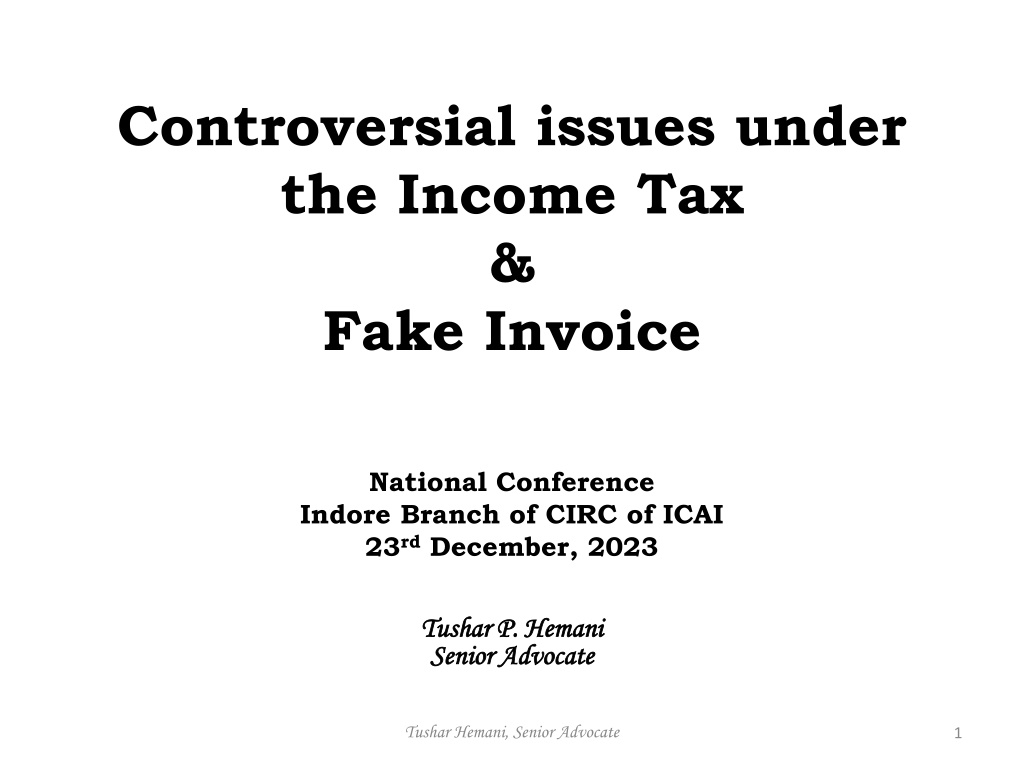





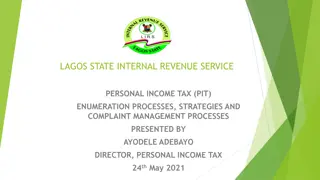


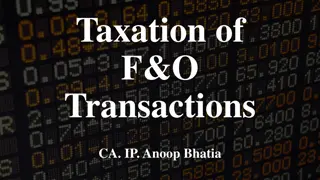
![Town of [Town Name] Real Estate Tax Rates and FY 2024 Budget Summary](/thumb/62211/town-of-town-name-real-estate-tax-rates-and-fy-2024-budget-summary.jpg)
